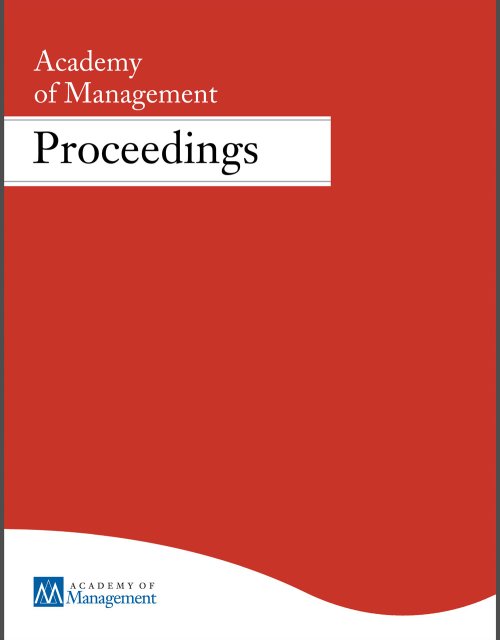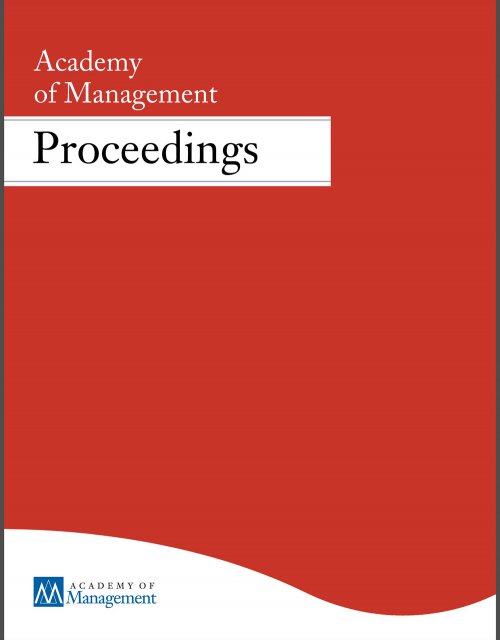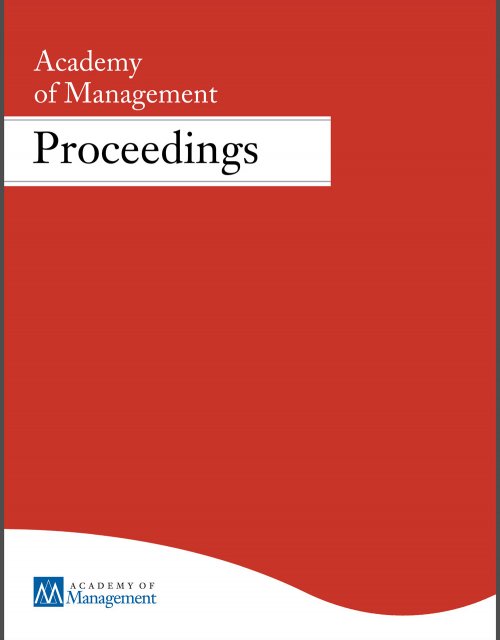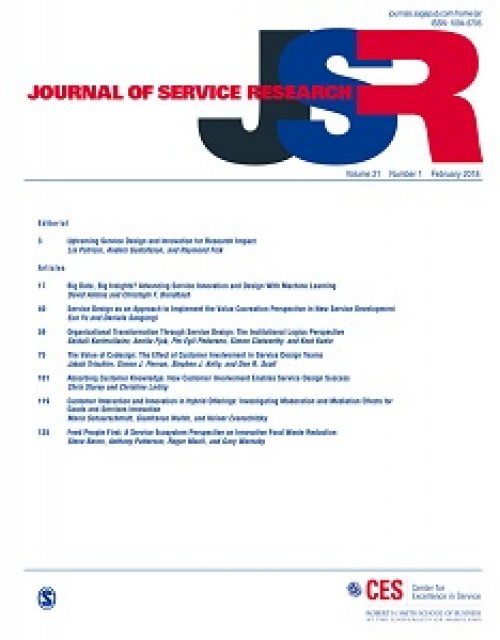Publication records
Subject(s)
Diversity and inclusion; Strategy and general management
Keyword(s)
gender, career, glass ceiling, machine learning
In an attempt to the literature on the gender glass ceiling, this working paper presents initial analyses based on the German linked employer-employee data (LIAB) social security records.
Volume
2023
ISSN (Online)
2151-6561
ISSN (Print)
0065-0668
Subject(s)
Human resources management/organizational behavior
Keyword(s)
networking behavior, network processes, consequences of networks
Although the topic of social networks has received substantial attention from researchers in the field of management, most work on networks at the individual level of analysis has focused on examining specific characteristics of employee networks (e.g., network structure, network centrality, etc.), often from a static perspective. In contrast, relatively little work has directly focused on the behaviors employees engage in to build and manage their social networks. As a result, there is still much to be learned about when and why employees enact networking behavior. The papers in this symposium aim to address this imbalance by directly examining the antecedents and outcomes of professional networking behavior. While the research designs and theoretical lenses of the papers in this symposium vary, the papers are united in their shared focus on various aspects of networking behavior. Two papers focus directly on factors that impact the extent to which employees engage in network building, one takes a temporal approach by examining the factors that influence the speed by which network relationships are formed, and one paper examines how daily fluctuations in networking behavior influence performance outcomes. The end result is a collection of papers that provide a comprehensive look at a complex and multifaceted phenomenon that has begun to attract an increasing amount of research attention among management scholars.
Volume
2023
ISSN (Online)
2151-6561
ISSN (Print)
0065-0668
Subject(s)
Human resources management/organizational behavior; Strategy and general management
Keyword(s)
managerial and organizational cognition
Acquiring tacit knowledge is critical at work and often requires interactions, strong ties, and trust. However, it is unclear how the advent of virtual collaboration influences this process. Integrating research on virtual work, tacit knowledge, social learning, and vicarious learning, we propose that relative to face-to-face collaboration, virtual collaboration hinders the acquisition of tacit knowledge, mainly by reducing people’s observation of others’ behaviors but not the storytelling from others. We found evidence for our theory in a survey study and a critical incident study. According to the experiences from a range of professions requiring on-the-job-learning, virtual collaboration indeed hampers tacit knowledge acquisition via the reduction in observation. However, virtual collaboration is as effective as face-to-face collaboration in facilitating the acquisition of tacit knowledge via storytelling. Additionally, we find that whenever the tacit knowledge being transferred is task-based, virtual collaboration is a more effective conduit than face-to-face collaboration. When the tacit knowledge is more contextualized or embodied, such as interpersonal skills, personal development, and socialization, virtual collaboration becomes a less effective conduit than face-to-face collaboration. Our research unravels how and what people learn from others as tacit knowledge in virtual collaboration compared to face-to-face collaboration, which has important theoretical and practical implications.
With permission of the Academy of Management
Volume
2023
ISSN (Online)
2151-6561
ISSN (Print)
0065-0668
Subject(s)
Diversity and inclusion; Human resources management/organizational behavior; Strategy and general management
Keyword(s)
gender, networks, structural holes, brokerage, field experiment
A well-stablished tenet among organizational network scholars is that it is harder for women to broker structural holes because the brokerage process requires stereotypically masculine behaviors such as self-promotion, instrumental exchanges, and strategic networking. Yet, this perspective overlooks the possibility that women may become successful brokers by leveraging stereotypically female relational strategies based on interpersonal caring and warmth. Rather than defining brokerage as an inherently masculine strategy, we conducted a field experiment in which the “treatment” (a quasi-random assignment of managers to office desks) generated exogenous brokerage opportunities that are more congruent with feminine than masculine role stereotypes. The field experiment yielded three key insights. First, female managers were more effective than their male peers at forming new bridging relations. Second, these bridging relationships were based on friendship; hence, they were defined by interpersonal caring and warmth rather than by instrumental motives as is typical of masculine brokerage strategies. Third, though based on friendship, these bridging relationships yielded sizeable instrumental returns as measured by salary increases x number of months after the treatment. By highlighting the understudied role of feminine brokerage strategies, these results caution against the widespread tendency to define brokerage as inherently masculine, they advance our theoretical understanding of the relation between gender and brokerage effectiveness, and they offer practical insights on how to improve gender equality within organizations.
With permission of the Academy of Management
Volume
2023
ISSN (Online)
2151-6561
ISSN (Print)
0065-0668
Subject(s)
Diversity and inclusion; Health and environment; Management sciences, decision sciences and quantitative methods; Product and operations management
Keyword(s)
shared medical appointments, patient compliance, patient satisfaction, innovation in healthcare delivery, global public health, healthcare operations
In Shared Medical Appointments (SMAs), patients with similar conditions meet the physician together and each receives one-on-one attention. SMAs can improve outcomes and physician productivity. Yet privacy concerns have stymied adoption. In physician-deprived nations, patients’ utility from improved access may outweigh their disutility from loss of privacy. Ours is to our knowledge the first SMA trial for any disease, in India, where doctors are scarce. In a 1,000-patient, single-site, randomized controlled trial at Aravind Eye Hospital, Pondicherry, we compared SMAs and one-on-one appointments, over four successive visits, for patients with glaucoma. We examined patients’ satisfaction, knowledge, intention-to-follow-up, follow-up rates, and medication compliance rates (primary outcomes) using intention-to-treat analysis. Of 1,034 patients invited between July 12, 2016 – July 19, 2018, 1,000 (96.7%) consented to participate, and were randomly assigned to either SMAs (NSMA=500) or one-on-one appointments (N1-1=500). Patients who received SMAs showed higher satisfaction (MeanSMA=4.955 (SD 0.241), Mean1-1=4.920 (SD 0.326); difference in means 0.035; 95% CI, 0.017-0.054, p=0.0002) and knowledge (MeanSMA=3.416 (SD 1.340), Mean1-1=3.267 (SD 1.492); difference in means 0.149; 95% CI, 0.057–0.241, p=0.002) than patients who received one-on-one appointments. Across conditions, there was no difference in patients’ intention-to-follow-up (MeanSMA=4.989 (SD 0.118), Mean1-1=4.986 (SD 0.149); difference in means 0.003; 95% CI, -0.006–0.012, p=0.481) and actual follow-up rates (MeanSMA=87.5% (SD 0.372), Mean1-1=88.7% (SD 0.338); difference in means -0.012; 95% CI, -0.039–0.015, p=0.377). Patients who received SMAs exhibited higher medication compliance rates (MeanSMA=97.0% (SD 0.180), Mean1-1=94.9% (SD 0.238); difference in means 0.020; 95% CI, 0.004–0.036, p=0.013). SMAs improved satisfaction, learning, and medication compliance, without compromising follow-up rates or measured clinical outcomes. Peer interruptions were negatively correlated with patient satisfaction in early-trial SMAs and positively correlated with patient satisfaction in later-trial SMAs. The trial was registered with Clinical Trials Registry of India with reference no. REF/2016/11/012659 and registration no. CTRI/2018/02/011998.
©2023 Sönmez et al.
Volume
3
Journal Pages
e0001648
ISSN (Online)
2767-3375
Subject(s)
Marketing
Keyword(s)
price negotiation, power, dependency, buyer–seller relationship, demand contraction
Extant literature has studied how customer–salesperson price negotiations evolve in “normal” circumstances. However, recent economic recessions illustrate the need to advance theory on the question of how price negotiations evolve in “abnormal” times when customer demand significantly contracts beyond expected variation. In response to this gap in the literature, this study uses a multi-method design to investigate price negotiations during exceptional demand contractions. Our results from a theories-in-use study reveal that during such circumstances, salespeople’s perceived dependency on customers increases while customers’ perceived dependency on salespeople decreases. The inherent “power shift” should benefit customers in subsequent price negotiations. However, customers are less likely to capitalize on their power if they have a close relationship with a salesperson, implying that salespeople do not have to concede on price negotiations. This effect is likely due to increased sympathy during periods of exceptional demand contractions. The authors further validate key propositions from this qualitative study in a field study and a scenario-based experiment. Altogether, this study suggests that managers should not be too hasty in approving and encouraging salespeople to offer unnecessary price discounts during exceptional demand contractions as buyers may become more sympathetic and lenient during price negotiations.
With permission of SAGE Publishing
Volume
26
Journal Pages
351–370
Subject(s)
Entrepreneurship; Technology, R&D management
Keyword(s)
indirect effects, innovation, mergers and acquisitions (M&A), research and development (R&D), startups, tax credits
JEL Code(s)
G00, G34, H24, M13, O31
Pages
32
Subject(s)
Human resources management/organizational behavior
Keyword(s)
human resource management, career shocks, executive coaching
This case is a set of five vignettes describing career shocks experienced by managers. The stories behind the vignettes were presented by respective protagonists to an executive coach immediately after experiencing a career shock. They can be used for discussion of the topic of career shocks or as exercises in executive coaching or career counseling.
| buy now | buy now | buy now |
Subject(s)
Management sciences, decision sciences and quantitative methods
Keyword(s)
congestion, diagnostic accuracy, experiments, partially observable markov decision process, path-dependent decision making, undertesting, task completion bias
To study the effect of congestion on the fundamental trade-off between diagnostic accuracy and speed, we empirically test the predictions of a formal sequential testing model in a setting where the gathering of additional information can improve diagnostic accuracy, but may also take time and increase congestion as a result. The efficient management of such systems requires a careful balance of congestion-sensitive stopping rules. These include diagnoses made based on very little or no diagnostic information, and the stopping of diagnostic processes while waiting for information. We test these rules under controlled laboratory conditions, and link the observed biases to system dynamics and performance. Our data shows that decision makers (DMs) stop diagnostic processes too quickly at low congestion levels where information acquisition is relatively cheap. But they fail to stop quickly enough when increasing congestion requires the DM to diagnose without testing, or diagnose while waiting for test results. Essentially, DMs are insufficiently sensitive to congestion. As a result of these behavioral patterns, DMs manage the system with both lower-than-optimal diagnostic accuracy and higher-than-optimal congestion cost, underperforming on both sides of the accuracy/speed trade-off.
© 2023, INFORMS
Volume
71
Journal Pages
791–1020
Subject(s)
Economics, politics and business environment
Keyword(s)
Credit card demand reactions to fees, late fee regulation, limited attention
JEL Code(s)
D12, D90, G50
We introduce a model of a rational credit card user's rather complex usage choices and develop an empirical framework to test its predictions. Employing a large national database of U.S. card accounts, we estimate how prices impact card usage and find that price effects are mostly well explained within our model. An exception is less borrowing in response to declining late-fees among low credit-score (subprime) users. Extension of our model based on "focusing theory" predicts this behavior. It also implies substantial indirect benefits of the CARD Act's late-fee cap due to subprime users re-focusing toward reducing their debt.
Volume
63
Journal Pages
273–311



